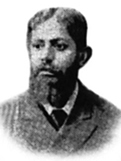Bose, Ananda Mohan

Bose, Ananda Mohan (1847-1906) nationalist leader, social reformer and brahma samaj leader. Born in a landed family at village Joysiddhi in Kishoreganj district. Ananda Mohan Bose passed out Entrance from the Mymensingh Zila School in 1862 securing ninth position in the merit list.
He passed FA and BA from Presidency College and topped the list at both the examinations. His extraordinary performance in successive examinations earned him the covetous premchand roychand studentship of the University of Calcutta in 1870. The scholarship enabled Bose to proceed to England for higher studies. He studied Higher Mathematics at Christ Church College, Cambridge. He got first class in tripos and thus became the first Indian Wrangler. Simultaneously he was called to the Bar in 1874.
In public life Ananda Mohan’s mentor was surendranath banerjea with whom he first met in London in 1871. Bose had a religious bend of mind from early life. Along with his wife he adopted Brahma faith in 1869, a year before he left for England. On his return, Bose joined the religious and social reform movement launched by the Brahma Samaj, which was then led by keshab chandra sen. In his religious pursuit, Bose’s other associates were Pundit shibnath shastri, Umeshchandra Datta, Bijoykrishna Goswami and Dwarkanath Bandyopadhyaya.
There was a schism in the Brahma Samaj in 1878 on several issues, one of which was the question of marrying Keshabchandra Sen’s minor daughter to a minor son of the Raja of Kuch Behar. Ananda Mohan led the dissident group and established a new Brahma Samaj called Sadharan Brahma Samaj, which elected him its first president. Ananda Mohan built a democratic structure for managing the affairs of the Sadharan Brahma Samaj and advancing the movement.
For thirteen years he served the Sadharan Brahma Samaj as its president and during the period he established several Brahma institutions, including a spacious building complex for the Samaj in Calcutta. For physical and moral training of students of the Brahma institutions Bose, with the help of his closest associate Pundit Shivnath Shastri, had introduced a moral instructions course called Students Weekly Service to which he was the most frequent speaker.
Politically, Ananda Mohan Bose had two distinctive contributions. It was he who for the first time felt that under the colonial setting students, who constituted under the circomstances the most conscious section of the community, must play a productive role in social and political developments of the country and to that end they should have an organisation of their own.
Ananda mohan Bose thus established the Calcutta Students Association in 1875 and, to give status to it, he himself became its first president. On the political plane, Bose made another pioneering contribution by setting up a political association called indian association in 1876. Its objective was to organise constitutional agitation against the colonial regime. The Indian Association convened a national conference in 1883, which eventually turned out to be the indian national congress of which Bose was one of the founding leaders. Bose was elected president of the Congress at its Madras Session of 1898.
Ananda Mohan made significant contributions as a social reformer and educator. He worked hard for the promotion of female education. He called upon all to chalk out social programme to eradicate illiteracy from the society. In 1876 Bose established the Banga Mahila Vidyalaya in Calcutta. Later he amalgamated the Vidyalaya with the Bethune School in order to achieve better result in the organisation of female education. He founded the City College in Calcutta in 1879. A section of the City College was also opened at his residence in his hometown, Mymensingh. In reduced form the institution still exists under the name of City Collegiate School. The City College was renamed ananda mohan college in honour of Bose and shifted to its present site in 1908. Ananda Mohan Bose’s bright academic career and deep interest in education persuaded the government to include him as a member of the Indian Education Commission (hunter commission) of 1882.
Ananda Mohan Bose was successively nominated a member of the bengal legislative council, a member of the Calcutta University Senate and a Fellow of the University. It was due to his most persistent efforts that Calcutta University Act of Incorporation was so amended as to convert it from merely an examining body to a both examining and teaching institution. Under the india act of 1858 the calcutta university got the privilege to elect a member to the Bengal Legislative Council. Bose happened to be its first representative to the Council. As a nationalist, Bose vehemently opposed the partition of bengal, 1905. He presided over an anti-partition meeting on 16 October 1905 and addressed the mammoth gathering from sickbed. Soon after Ananda Mohan Bose died on 20 August 1906. [Sirajul Islam]
